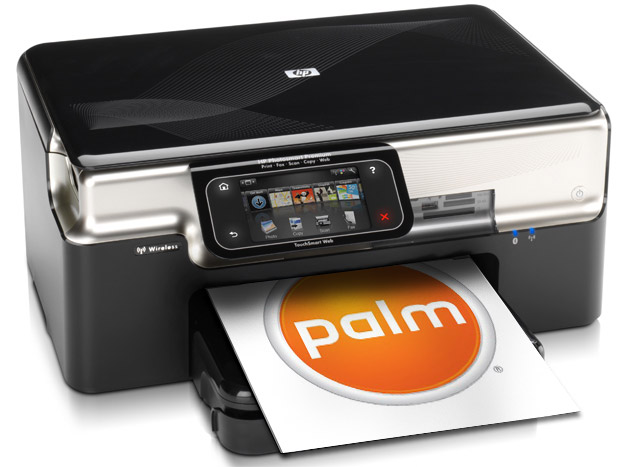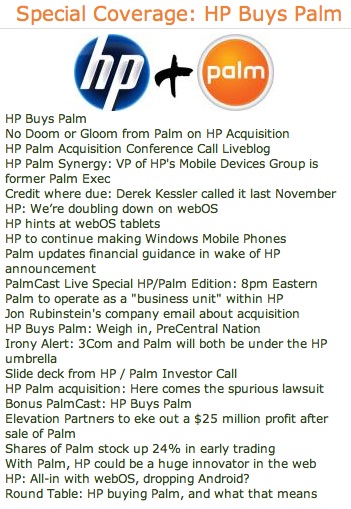The HP deal for Palm has garnered a ton of press.

John Paczkowski of All Things Digital's Digital Daily weighed in straightaway:
"Why? Why spend $1.2 billion on a company whose downward spiral has been the talk of Silicon Valley for the past year?
For a number of very good reasons (which I outlined in an oddly prefigurative post last week), but one above all: H-P wants its own operating system. And by acquiring Palm that's exactly what it's getting. The steady refrain during my conversation with HP execs this afternoon, "We're very excited about webOS ...We see great potential in webOS ...We're going to double down on webOS."
CNET's Tom Krazit, wrote a story (New competition for mobile with HP and webOS) about the impact of this deal:
"If Hewlett-Packard's proposed $1.2 billion acquisition of Palm goes through as expected sometime by the end of August, the smartphone race will have a new competitor with deep pockets. HP, barely a speck on the mobile landscape with its iPaq devices, spoke of plans to use Palm's WebOS in a variety of devices during a conference call Wednesday afternoon discussing the deal."
"...HP promised to increase spending on research and development as well as sales and marketing, courting developers with promises to develop a family of webOS devices beyond smartphones. That could include tablets, slate devices, and potentially netbooks, said Todd Bradley, head of HP's personal systems group."
"...But the mobile industry still has a few reasons to be wary of a combined HP-Palm. 'With the Palm purchase, HP has positioned itself as a player in this great technology battle,' said Tina Teng, a senior analyst with iSuppli."
"HP is a fierce competitor in PCs, servers, and IT services. There's no reason to think it won't make a mark on mobile with webOS."
InformationWeek's Eric Zeman said:
"This news is the result of a large number of bad decisions and miscalculations on both HP and Palm's parts. Before today, HP had no legitimate play in the vital smartphone space, and Palm's good software was dying a slow death in bad hardware. Both companies needed a fix, and HP's $1.2 billion acquisition of Palm looks to be the salvation each firm so desperately needs."
"In the end, this deal does at least one thing: it gives Palm time. With HP's resources, it won't die a quick death and will have at least a fighting chance instead. But Palm needs to go from a featherweight to a heavyweight. It needs to bulk up and win a few rounds, or its going down for the count."
In the San Francisco Chronicle, Ryan Kim's story ("Hewlett-Packard to buy smart phone firm Palm"), he wrote about "tight integration":
HP said it will continue to support Microsoft's Windows Mobile platform. But by buying Palm's webOS, it gains the ability to build mobile devices that, like Apple machines, enjoy tight integration between hardware and software.
"What's behind this is HP's desire to basically be in control of their hardware and software and services for mobile devices," said analyst Tim Bajarin of Creative Strategies. "It's a very smart move on HP's part. If they continue to go down the path of supporting Microsoft or Google's Android, they basically lose control."
Bradley of HP said the webOS can power not only smart phones, but also tablets, such as HP's planned Slate device, and netbooks. He said the company is committed to further developing webOS and expanding its marketing budget.
"We think there's a unique opportunity to create the HP experience across these products," he said.
A Forbes story ("The HP/Palm Deal: A Loss For Google's Android?") captured some analysts comments:
>> Analyst Jack Gold expects HP to apply webOS to tablets and other consumer devices, where it would compete with Android. "Google [is getting] a formidable competitor it didn't have before," wrote Gold in a research note.
>> Ross Rubin, director of industry analysis at the NPD Group, thinks HP will use webOS to build smartphone/netbook hybrids known as smartbooks or "quick boot" software for computers that would power up faster than Microsoft's Windows. Both are applications that might otherwise utilize Android. "We'll have to see whether HP continues to offer other operating systems," adds Rubin.
ComputerWorld's Richi Jennings did a roundup of stories in his IT Blogwatch post.

Fast Company did a story recapping the history of Palm.
Of course, your best source of all things HP-Palm is PreCentral.

###
Copyright 1999-2016 TreoCentral. All rights reserved :
Terms of Use : Privacy Policy
TREO and TreoCentral are trademarks or registered trademarks of palm, Inc. in the United States and other countries;
the TreoCentral mark and domain name are used under license from palm, Inc.
The views expressed on this website are solely those of the proprietor, or
contributors to the site, and do not necessarily reflect the views of palm, Inc.
Read Merciful by Casey Adolfsson


